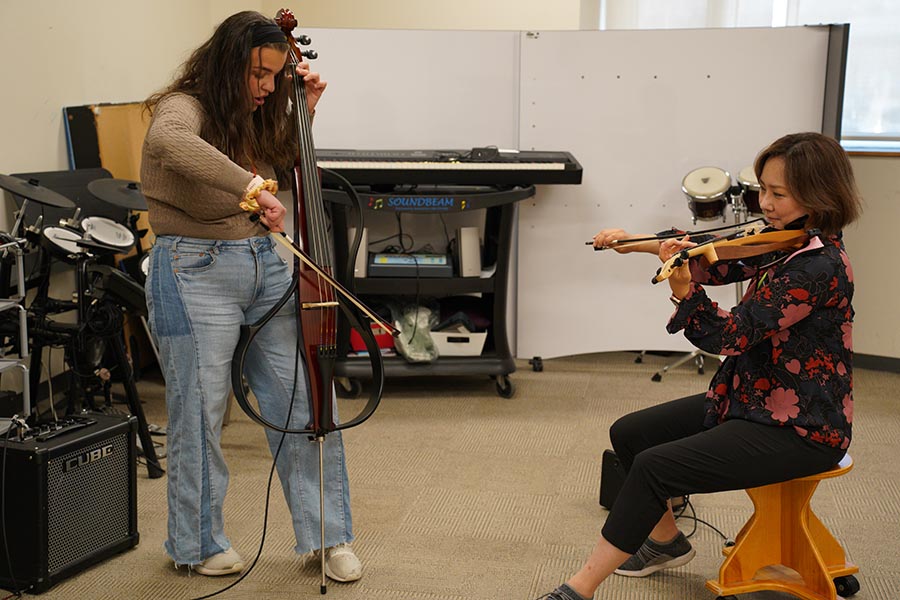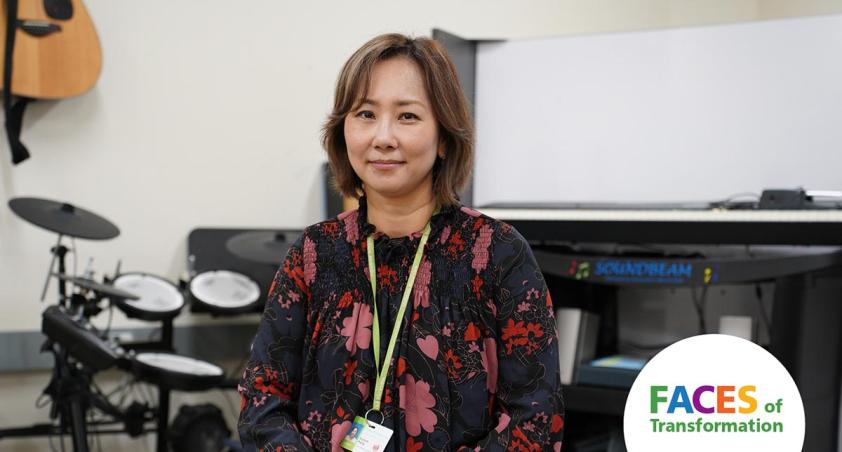When Eunice first walked through the doors of Holland Bloorview as a student volunteer, she wasn’t quite sure how to connect with the children. It was an unfamiliar environment and emotionally complex. But what she found was more than just a career path - it was a profound purpose.
“I was exploring a career in health care, specifically music therapy,” she recalls. “Through meaningful interactions with the children, I discovered a passion for music therapy.” Her love for music and the desire to help others came together in the most powerful way.
Today, Eunice supports both inpatient and outpatient clients using evidence-based music therapy techniques. She also trains interns, helping shape the next generation of music therapists.

Read on to learn more about Eunice:
What attracted you to work at Holland Bloorview?
The opportunity to grow alongside passionate colleagues who share a common goal: improving the lives of children. In collaborating with diverse team members, I’ve had the opportunity to developing meaningful programs such as Music and Movement, Let's Talk and Sing Together, Baby and Me – all designed to create a safe, engaging and therapeutic environment for our clients. My colleagues deeply respect and recognize the transformative power of music therapy in rehabilitation, fostering a workplace where my expertise is valued.
How has your career grown here at Holland Bloorview?
I started as a music therapy volunteer and after earning my degree in music therapy from Wilfrid Laurier University, I returned to complete a 10-month, full-time clinical internship. Once I completed my accreditation, and successfully completed this intensive training, I transitioned into my current role as a part-time music therapist.
What does a typical day look like for you?
My days are dynamic. My morning typically begins with one-on-one or small group sessions with clients, where interventions are tailored to their specific rehabilitation goals. Between sessions, I document progress, prepare materials and attend interdisciplinary rounds and family team meetings. There’s always room for flexibility to respond to urgent referrals, which keeps the work both challenging and rewarding.
What are some of the techniques you use in music therapy sessions?
I use a range of evidence-based music therapy approaches tailored to each client's needs. My interventions draw from both receptive and expressive modalities, including:
- Neurologic music therapy techniques - using rhythm, melody and other musical elements to target specific rehabilitation goals.
- Music-centred psychotherapy - utilizing clinical improvisation on piano, guitar, violin and various percussion instruments to facilitate emotional expression and processing.
- Creative music therapy - emphasizing the client’s spontaneous musical expression. This is the improvisational, client-centred approach where the client and I create live music (singing and playing together).
Can you describe a particularly memorable experience where music therapy made a significant impact on a client?
One of the most profound moments happened during a session with a young child and their mother. As we sang and played instruments together, I noticed tears on the mother’s face. She later shared it was the first time she’d heard her child sing their own name, and the pure joy radiating from the child's face had overwhelmed her.
This moment struck me deeply. While my academic training had taught me about the therapeutic potential of music, witnessing its transformative power in such a raw, emotional human moment was my most profound lesson. It crystallized why I chose this path: music doesn’t just support progress; it uncovers hidden possibilities and articulates emotions that words can’t express.
What are some of the biggest challenges you face as a music therapist?
Working with clients who request rap or hip-hop always pushes me out of my comfort zone – I’ll admit, my voice just doesn’t naturally suit those genres! My rhythm can be off, but I’ve learned to embrace the challenge. Instead of shying away, I turn it into a collaborative moment: ‘You’re the expert - teach me!’ Clients light up when they get to lead, and that role reversal often becomes a powerful therapeutic moment.
What do you find most rewarding about your work? What makes Holland Bloorview special to you?
There’s something truly magical about the sound of children’s voices - it’s like instant medicine for the soul. At Holland Bloorview, where kids face very real challenges, their ability to giggle, smile and find joy is incredibly powerful. It doesn’t matter if it’s before, during, or after a session – their happiness still reminds everyone around them that life, no matter how tough, is worth celebrating.
Do you have any hobbies or passions outside of work that you’d like to share?
Lately, I’ve fallen in love with Chinese dramas! They completely pull me into other worlds – I laugh, cry and feel like I’m living a thousand lives through the characters. I’m a very emotional viewer, so even the smallest moments can wreck me (in the best way). Whether it’s epic historical fantasies, heart-fluttering romances, or slice-of-life stories, I could binge for hours and never get bored.
Watch Eunice and Reede perform together in the music therapy studio:
